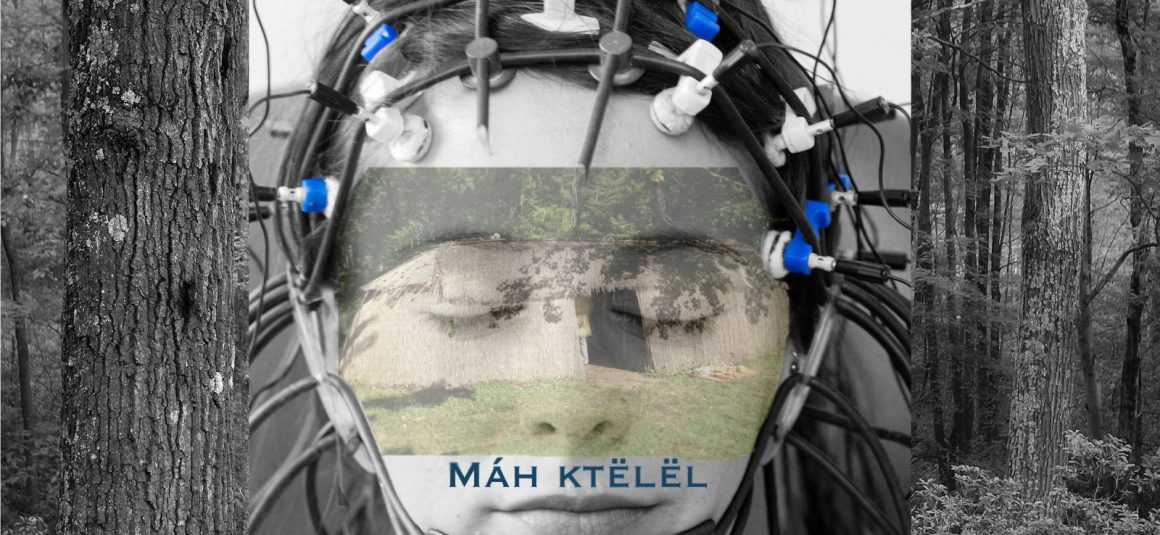Searching for a healing prayer with science, music and ancestral language. Spiderbones Performing Arts combines the arts of neuroscience, and music and language therapy with traditional Indigenous healing principles in its moving, mind-blowing multi-media production of Jeff D’Hondt’s Everything I Couldn’t Tell You, directed by Erin Brandenburg and running in the Theatre Centre’s Incubator space as part of the RISER Project.
Cassandra’s (Jenny Young) neuroscience has brought Megan (PJ Prudat) out of a coma, but she fears the combination of electric current and music applied to the brain may have done more harm than good. Still struggling to remember what happened to her, every emotion Megan feels presents as anger; attempts at talk therapy and other standard treatments aren’t working and Megan’s responses, fuelled by alcohol and her hatred of Cassandra, are becoming increasingly violent. When Megan fires Cassandra and demands a therapist who speaks Lenape, Cassandra reluctantly brings the experimental, unorthodox Indigenous neuropsychologist Alison (Cheri Maracle) onboard.
Unlike Cassandra’s method of electric and music impulses input into the passive brain, Alison’s method incorporates active, directed output from Megan’s brain, and translates those choices into music. Even more importantly, Alison has learned that conducting sessions in Lenape calms Megan’s tortured brain—and she’s convinced that a combination of their therapies will uncover Megan’s healing prayer.
While their approaches differ, Cassandra and Alison are both haunted by the loss of someone they loved very much: Cassandra’s partner Melanie (Cheri Maracle) and Alison’s sister Steph. Torn between maintaining a professional perspective and distance, and sharing their personal experiences of pain and grief, they both struggle with the question: who are they doing this work for? And who are they really treating—and what does this mean for Megan’s recovery?
Strong, compelling and heartbreaking performances all around in this powerful three-hander. Young delivers a taut performance as Cassandra; distant and clinical, even cold, on the surface, Cassandra is tightly wound—holding onto self-control with all her might and she navigates the aftershocks of losing Melanie while continuing her work, and lashes out with her sharp scientific mind. Moments of beautiful artistry and tenderness are revealed in a flashback, where the shy introvert Cassandra meets Melanie at a conference. Maracle brings a remarkable sense of strength and conflict to the brilliant, haunted Alison; struggling with her own ghosts, as well as confidence in herself and her theories in the face of so much doubt and derision, memories of her sister both break her heart and push her to find a way to help Megan. Alison’s determined to connect—and persists through each barrier and set-back. Prudat’s Megan is part wild child, part lost girl; as her memories surface, she mourns the familial discouragement away from her heritage, her own Uma (grandmother) steering her towards piano lessons to get her away from the ‘evil’ drum. Her irreverent, devil-may-care feral outbursts are both a cover for and a symptom of her profound pain and suffering—and she’s got the guts to do whatever it takes to get better and get her life back, however dangerous it may be.
Shouts to the evocative work from the design team: Michel Charbonneau (set), Tess Girard (videographer), André du Toit (lighting), Isidra Cruz (costume) and Andrew Penner (sound/composition) for creating a world that combines the clinical with the natural in a striking, innovative way. White set, with images—brain scans, shimmering water and art therapy drawings—and English translations of the Lenape text projected on pieces of scrim that hang like hospital curtains. The scrim also creates ghost-like barriers for flashbacks featuring lost loved ones. And there’s an opportunity to hear the Lenape language in a visceral way, with bone conduction headphones that transmit the sound into your cheekbones, providing a physical experience of the language and leaving your ears free to hear it. Headsets are limited, and distributed via a combination of game of chance and lottery draw before each performance.
Science, music, art and language combine in the search of a healing prayer in Spiderbones Performing Arts’ mind-blowing, heart-wrenching Everything I Couldn’t Tell You.
Everything I Couldn’t Tell You continues in the Theatre Centre Incubator space until May 12. Tickets available by calling The Theatre Centre’s Box Office at 416-538-0988 or online; advance booking strongly recommended, as it’s an intimate space and a short run.

